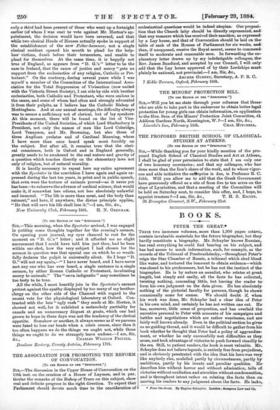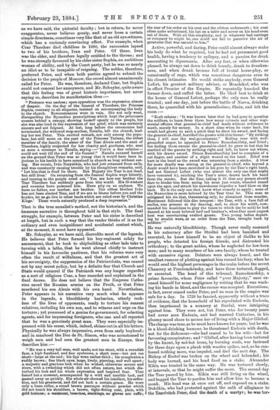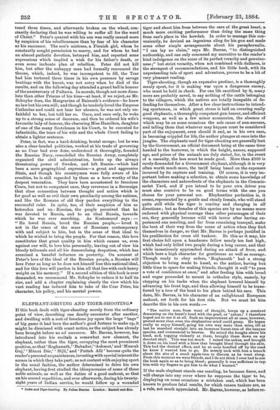BOOKS.
PETER THE GREAT.*
THESE two immense volumes, more than 1,300 pages octavo,. contain invaluable materials for the future biographer, but they hardly constitute a biography. Mr. Schuyler knows Russian, has read everything he could find bearing on his subject, and has had access to much information, such, for example, as the- records of the Tribunal of Preobrazhensky,—throughout Peter's. reign the Star Chamber of Russia, a tribunal which shed blood like water, and tortured the innocent to obtain evidence—which was closed to his predecessors, but he has not the instinct of the- biographer. He is by nature an annalist, who relates at great length, but simply and easily, all the facts he has collected, twisting nothing, concealing little, but leaving the reader to. form his own judgment on the data given. He has absolutely nothing of the pictorial faculty for persons, though he shows: occasionally some for scenes. We should doubt if, when his work was done, Mr. Schuyler had a clear idea of Peter- in his own mind, and certainly he has not written one out. He has, moreover, little sense of proportion, and has overlaid the narrative personal to Peter with accounts of his campaigns and battles and negotiations which are rather wearisome, and are fairly well known already. Even in the political section he gives. us no guiding-thread, and it would be difficult to gather from his- book whether he thought that Peter had a policy of aggrandise- ment, or whether he only successfully met difficulties as they arose, and took advantage of victories to push forward steadily to the sea. Still, to patient readers, the book is most valuable. Mr.. Schuyler does not believe legends, is entirely free from prejudices, and is obviously penetrated with the idea that his hero was very like anybody else, modelled partly by circumstances, partly by ambitions, partly by his innate and peculiar qualities. He describes him without horror and without admiration, tells of victories without exultation and atrocities without condemnation, and is throughout intent rather on relating the facts than on moving his readers to any judgment about the facts. He lacks, • Peter the Great. By Eugene Schuyler. London : Sampson Low mid Co.
as we have said, the pictorial faculty ; but in return, he never exaggerates, never believes gossip, and never loses a certain simple directness, sometimes very like that of an old eyewitness,
which has a curiously convincing effect. For example, when Czar Theodore died childless in 1680, the succession lapsed to two of his brothers, Ivan and Peter. Of these, Ivan was the elder, and therefore legally entitled to the throne ; and he was strongly favoured by his elder sister Sophia, an ambitious woman of ability, and by the Court party, but he was so nearly an idiot as to be incapable of reigning. The nobles, therefore,
preferred Peter, and when both parties agreed to submit the decision to the people of Moscow, the crowd almost unanimously called for Peter. He was, therefore, declared Czar, but Sophia could not conceal her annoyance, and Mr. Schuyler, quite aware that this feeling was of great historic importance, but never caying so, describes its manifestation thus
Pretence was useless; open opposition was the expression almost -of despair. On the day of the funeral of Theodore, the Princess Sophia, contrary to all etiquette, insisted on accompanying the body to the church. Remonstrances were in vain. She not only went, -disregarding the Byzantine prescriptions which kept the princesses unseen behind a :canopy, showing herself openly to the people, but she was also loud in the expression of her grief, which was certainly sincere and not feigned. At last, long before the ceremonies had -terminated, the widowed step-mother, Natalia, left the church, lead- ing her son Peter. This excited remark, not only among the popu- lace, but still more on the part of the Princess Tatiana, the eldest =ember of the family, the sister of the Tsar Alexis and the aunt of 'Theodore, highly respected for her charity and goodness, who sent
at noon a message to Natalia, saying You're a fine relation— could not wait till the end of the funeral !' Natalia excused herself on the ground that Peter was so young that it would have been in- jurious to his health to have remained in church so long without eat- ing. Her cousin, Ivan Naryshkin, who had just returned from exile, and was constantly causing trouble by his thoughtless remarks, said, ` Let him that is dead lie there. Her Majesty the Tsar is not dead, but still lives.' On returning from the funeral Sophia wept bitterly, and turning to the people cried out, Yon see how our brother the Tsar Theodore has suddenly gone from this world. His ill-wishers and enemies have poisoned him. Have pity on us orphans. We bave no father, nor mother, nor brother. Our eldest brother Ivan has not been elected Tsar, and if we are to blame before you and the boyars, let us go live in other lands which are ruled over by Christian Rings.' These words naturally produced a deep impression."
'That is the true annalist's method, not the historian's, and the immense narrative is throughout told in that style. The final struggle, for example, between Peter and his sister is described at length, but in such a way that the reader thinks of it as the 'ordinary and even insignificant and accidental contest which, at the moment, it must have appeared.
Mr. Schuyler, as we have said, discredits most of the legends.
Ile believes that Peter formed his boy-regiment solely for amusement, that he took to shipbuilding as other lads take to turning with a lathe, that he went abroad chiefly to instruct himself in his favourite pastimes, that his reforms were very eften the result of wilfulness, and that the greatest act of his sovereignty, the suppression of the Patriarchate, was caused not by any secret policy, but by a definite fear that Church and State would quarrel if the Patriarch was any longer regardtd as a sort of religious Czar, a fear recorded and explained in the final decree. He does not believe that the Empress Cathe- rine saved the Russian armies on the Prnth, or that Peter murdered his son Alexis with his own hand. Nevertheless, Peter appears in his narrative very much what he appears in the legends, a bloodthirsty barbarian, utterly reck- less of the lives of opponents, ready to torture his nearest relatives, including his own son, and to witness and urge on the tortures ; yet possessed of a genius for government, for selecting agents, and for impressing foreigners, who one and all reported that he was a genuinely great man. They were especially im- pressed with his sense, which, indeed, shines out in all his letters.
Physically he was always impressive, even from early boyhood ; and in manhood the Duo de St. Simon, who was accustomed to weigh men and had seen the greatest men in Europe, thus describes him :—
" He was a very tall man, well made,mot too stout, with a roundish face, a high forehead, and fine eyebrows, a short nose—but not too ehort—large at the end ; his lips were rather thick ; his complexion a ruddy brown; fine black eyes, large, lively, piercing, and well apart ; a majestic and gracious look when he wished, otherwise severe and stern, with a twitching which did not often return, but which dis- turbed his look and his whole expression and inspired fear. That lasted but a moment, accompanied by a wild and terrible look, and passed away as quickly. His whole air showed his intellect, his reflec- tion, and his greatness, and did not lack a certain grace. He wore only a linen collar, a round brown perruque without powder which did not touch his shoulders, a brown, tight-fitting coat, plain, with gold buttons; a waistcoat, breeches, stockings, no gloves nor cuffs; the star of his order on his coat and the ribbon underneath ; his coat often quite unbuttoned, his hat on a table and never on his head even out of doors. With all this simplicity, and in whatever bad carriage or company he might be, one could not fail to perceive the air of greatness that was natural to him."
Active, powerful, and daring, Peter could almost always make his body do what he required, but he had not permanent good health, having a tendency to epilepsy, and a passion for drink amounting to dipsomania. After any feat, or when otherwise pleased, he always sat down to drink brandy, drank to drunken- ness, and when drunk became full of brutal horse-play, or occasionally of rage, which was sometimes dangerous even to his closest intimates. He would strike anybody. even General Lefort, his greatest military adviser, or Menshikof, who was in effect Premier of the Empire. He repeatedly knocked the former down, and cuffed the latter. He liked beat to drink at the house of General Lefort, perhaps the only man he really trusted; and one day, just before the battle of Narva, drinking there, he quarrelled with his generalissimo, Shein, and left the room :—
"Korb relates : It was known later that he had gone to question the soldiers, to learn from them how many colonels and other regi- mental officers that general-in-chief had made without reference to merit, merely for money. In a short time when he came back, his wrath had grown to such a pitch that he drew his sword, and facing the general-in-chief, horrified the guests with this threat: "By striking thus, I will mar thy mal-government." Boiling over with well- grounded anger, he appealed to Prince Ramodanofsky, and Zatof ; but finding them excuse the general-in-chief, he grew so hot that he startled all the guests by striking right and left, he knew not where, with his drawn sword. Prince Ramodan6fsky had to complain of a cut finger, and another of a slight wound on the head. Zatof was hurt in the hand as the sword was returning from a stroke. A blow far more deadly was aiming at the general-in-chief, who beyond a doubt would have been stretched in his gore by the Tsar's right hand, had not General Lefort (who was almost the only one that might have ventured it), catching the Tsar's arms, drawn back his hand from the stroke. But the Tsar, taking it ill that any person should dare to hinder tun from sating his most just wrath, wheeled round upon the spot, and struck his unwelcome impeder a hard blow on the back. He is the only one that knew what remedy to apply ; none of the Muscovites is more beloved by the Tsar than he. This man so mitigated his ire that, threatening only, he abstained from murder. Merriment followed this dire tempest : the Tsar, with a face full of smiles, was present at the dancing, and, to show his mirth, com- manded his musicians to play the tunes to which (so he said) he had danced at his most beloved lord and brother's, when that most august host was entertaining exalted guests. Two young ladies depart- ing by stealth were, at an order from the Tsar, brought back by soldiers.'" He was naturally bloodthirsty. Though never really menaced in his autocracy after the Streltsi had been banished and
executed, he knew himself to be an object of dislike to his people, who detested his foreign friends, and distrusted his orthodoxy; to the great nobles, whom he neglected for low-born men; and to many members of his own family, whom he treated with excessive rigour. Delators were always heard, and the smallest rumour of plotting against him roused his fury, when he would send the highest personages in the realm before the secret
Chancery at Preobrazhensky, and have them tortured, flogged, or executed. The head of this tribunal, Ramodanofsky, a prime favourite, whom Peter called "your Majesty," once ex- cused himself for some negligence by writing that he was wash- ing his hands in blood, and the excuse was accepted. Executions, in fact, never ceased under Peter, and no man in the empire was safe for a day. In 1728 he fancied, apparently without a trace of evidence, that the household of his repudiated wife Eudoxia, then imprisoned in a nunnery at Suzdal, were intriguing against him. They were not, but Peter, who for twenty years had never seen Endoxia, and had married Catherine, in his gloomy mood chose to accuse her of living with a Major Glifibof. The charge was true, as he must have known for years; but he was
in a blood-drinking humour, he threatened Endoxia with death, not for the dishonour—she had ceased to be his wife—but for favouring conspirators; and" Gliebof, after having been tortured by the knout, by red-hot Irons, by burning coals, was fastened for three days upon a plank with wooden spikes, and, as he con- fessed nothing more, was impaled, and died the next day. The Bishop of Rostof was broken on the wheel and beheaded ; his body was burned, and his head fixed on a stake. Alexander Bikin was treated in the same way. He was tortured slowly,
at intervals, so that he might suffer the more. The second day the Tsar passed by him. Elkin was still living on the wheel, and begged the Tsar to pardon him and allow him to become a monk. His head was at once cut off, and exposed on a stake. Dokfikin, who had protested against the oath of allegiance to the Tsarevitch Peter, died the death of a martyr; he was tor- tared three times, and afterwards broken on the wheel, con- stantly declaring that he was willing to suffer all for the word of Chris]' Peter's quarrel with his eon was really caused more by suspicion of his rebelliousness than by fear of his character as his successor. The son's mistress, a Finnish girl, whom he constantly sought permission to marry, and for whom he had an almost pathetic devotion, betrayed him, and reported some expressions which implied a wish for his father's death, or even some inchoate plan of rebellion. Peter did not kill him, but after the unhappy man had formally renounced the throne, which, indeed, he was incompetent to fill, the Tsar had him tortured three times in his own presence by savage beatings with the knout, was not sorry when he died of the results, and on the following day attended a grand ball in honour of the anniversary of Pultawa. In morals, though not more disso- lute than other Princes of his time—at least, if we reject, as Mr. Schuyler does, the Margravine of Baireuth's evidence—he knew no law but his own will; and though he tenderly loved the Empress Catherine and could not bear her absence, he was not only un- faithful to her, but told her so. Once, and once only, he woke np to a strong sense of decorum, and then he ordered his wife's favourite lady-of-honour, the charming Miss Hamilton, daughter of one of the many Scotchmen in his Court, to be executed for infanticide, the tears of his wife and the whole Court failing to obtain a lighter sentence.
Peter, in fact, was a hard-drinking, brutal savage; but he was also a clear-headed politician, worked at his trade of governing as no Czar had ever done, understood it thoroughly, founded the Russian Navy, remodelled the Russian Army, completely organised the civil administration, broke up the always threatening power of Sweden, and left Russia—which had been a mere geographical expression—a great and aggressive State, and though his countrymen were fully aware of his cruelties, he is still regarded by them as a hero worthy of the deepest veneration. They have been accustomed to ferocious Czars, but not to competent ones, they reverence in a Sovereign that close connection between thought and action which is for good as well as evil their own peculiarity among the nations, and like the Romans of old they pardon everything to the successful ruler. In spite, too, of their suspicion of him as heterodox and un - Russian, the people perceived that he was devoted to Russia, and to an ideal Russia, towards which he was ever marching. As Kostomarof says : — "He loved Russia, loved the Russian people,— loved it not in the sense of the mass of Russians contemporary with and subject to him, but in the sense of that ideal to which he wished to bring the people. For that reason, this love constitutes that great quality in him which causes us, even against our will, to love him personally, leaving out of view his bloody tribunals and all his demoralising despotism, which has exercised a baneful influence on posterity. On account of Peter's love of the ideal of the Russian people, a Russian will love Peter as long as he does not himself lose this national ideal, and for this love will pardon in him all that lies with such heavy weight on his memory." If a second edition of this book is ever demanded, we recommend Mr. Schuyler to reduce it to half its size, and add a chapter explaining clearly the view which his vast reading has induced him to take of the Czar Peter, his character, his policy, and his mental powers.




































 Previous page
Previous page